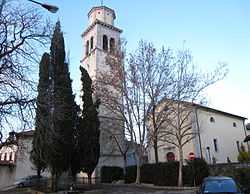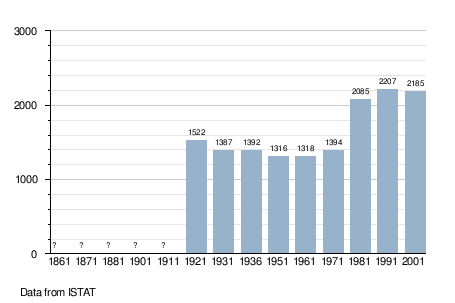Sgonico
| Sgonico Zgonik | |
|---|---|
| Comune | |
| Comune di Sgonico / Občina Zgonik | |
 | |
 Sgonico | |
| Coordinates: 45°44′N 13°45′E / 45.733°N 13.750°ECoordinates: 45°44′N 13°45′E / 45.733°N 13.750°E | |
| Country | Italy |
| Region | Friuli-Venezia Giulia |
| Province | Province of Trieste (TS) |
| Frazioni | Bristie (Brišče), Borgo Grotta Gigante (Briščiki), Campo Sacro (Božje Polje), Colludrozza (Koludrovica), Devincina (Devinščina), Gabrovizza San Primo (Gabrovec), Rupinpiccolo (Repnič), Sagrado di Sgonico (Zagradec), Sales (Salež), Samatorza (Samatorca), Sgonico (Zgonik) |
| Area | |
| • Total | 31.3 km2 (12.1 sq mi) |
| Population (Dec. 2004) | |
| • Total | 2,130 |
| • Density | 68/km2 (180/sq mi) |
| Time zone | CET (UTC+1) |
| • Summer (DST) | CEST (UTC+2) |
| Postal code | 34010 |
| Dialing code | 040 |
| Website | Official website |
Sgonico (Slovene: Zgonik) is a comune (municipality) in the Province of Trieste in the Italian region Friuli-Venezia Giulia, located about 12 km northwest of Trieste, on the border with Slovenia. As of 31 December 2004, it had a population of 2,130 and an area of 31.3 km2.[1] According to the 1971 census, 81.6% of the population are Slovenes.
Sgonico borders these municipalities: Duino-Aurisina, Monrupino, Sežana (Slovenia), and Trieste.
Name
The name of the settlement was first attested in 1309 as Swonich (and as de Svonicho in 1348, de Vonicho in 1373, de Champanilo in 1374, de villa Svonich in 1421, Suonich and de Suonigo in 1525, and Sgonico in 1819). The name is of Slovene origin, derived from the Slovene common noun zvonik, "belfry", (in reference to the church of Saint Michael). The phonological change zvonik to zgonik is characteristic of the local Slovene dialect; cf. also dialect zgon, "bell", from zvon.[2]
Points of interest
Demographic evolution

References
- ↑ All demographics and other statistics: Italian statistical institute Istat.
- ↑ Snoj, Marko. 2009. Etimološki slovar slovenskih zemljepisnih imen. Ljubljana: Modrijan and Založba ZRC, p. 480.